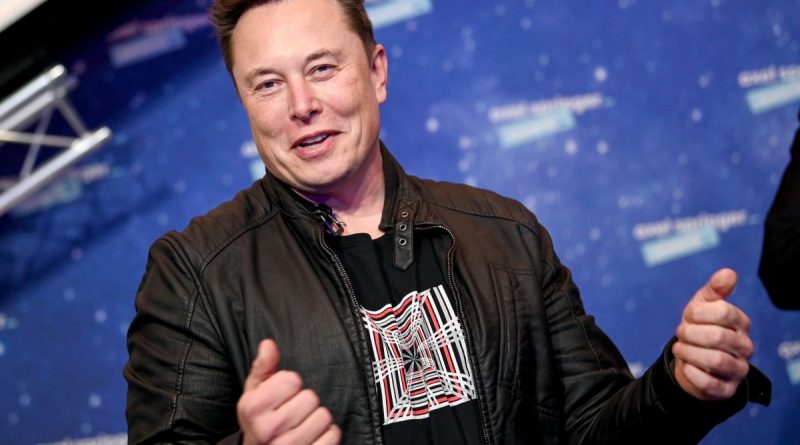The 6 secrets of Elon Musk that led him to be the new richest man in the world | The State
Elon Musk just became the richest person in the world, surpassing Amazon founder Jeff Bezos.
The Tesla and SpaceX founder’s net worth exceeded $ 185,000 million, according to the Billionaires Index of Bloomberg, after the electric car company’s stock price rose on Thursday and it reached a market value of $ 700 billion.
Although other lists, such as that of Forbes, they still place him behind Bezos, his success is undeniable.
What is your secret? A few years ago I spent almost an hour talking about exactly this with him.
To mark her new milestone, we decided to dust off the interview and share it with you. So here is Elon Musk’s guide to business success.
1. It’s not about the money
This is absolutely central to Musk’s attitude toward business.
When I interviewed him in 2014, he said he didn’t know how rich he was.

“It’s not like I have a ton of cash somewhere,” he said. “It’s just that I have a certain number of shares in Tesla, SpaceX and SolarCity, and the market places value on those shares.” He has nothing against the pursuit of wealth “if it is done in an ethical and good way,” but said that is not what drives him.
The approach certainly seems to be working.
But Musk, who turns 50 in 2021, doesn’t expect to die rich.
The businessman believes that most of his money will be spent on building a base on Mars, and it wouldn’t surprise him if the project consumed his entire fortune.
In fact, like Bill Gates, you would probably consider ending your life with billions in the bank to be a sign of failure for not putting that money to good use.
2. Follow your passions
That base on Mars is a clue to what Musk believes is the key to success.
“You want things to improve in the future,” he told me. “You want these new and exciting things to improve life.”

Take SpaceX as an example. Musk told me that he created the company because he was frustrated that America’s space program was not more ambitious.
“I kept hoping that we would move beyond Earth and that we would put a person on Mars, that we would have a base on the Moon and that we would have, you know, very frequent orbital flights,” he said.
As that was not happening, he came up with the idea for the “Mars Oasis Mission”, which aimed to send a small greenhouse to the red planet.
The idea was to get people excited about space again and persuade the US government to increase NASA’s budget.
As he tried to get that idea off the ground, he realized that the problem was not “a lack of will, but rather a lack of a way to do it” – space technology was far more expensive than necessary.
AND voila! SpaceX was born, the cheapest rocket launch business in the world.

But here’s the bottom line: His goal was not to make money, but to get a person to Mars.
Musk told me that he considers himself an engineer rather than an investor, and that what wakes you up in the morning is the desire to solve technical problems.
That is your criterion of progress, more than the dollars in the bank. He knows that every hurdle his companies overcome helps everyone else trying to solve the same problem, and it is solved forever.
That is why, shortly before we met, the businessman had announced that he was going to release all Tesla patents to accelerate the development of electric vehicles around the world.
3. Don’t be afraid to think big
One of the really amazing things about Musk’s businesses is how bold they are.
He wants to revolutionize the automobile industry, colonize Mars, build super-fast trains in vacuum tunnels, integrate artificial intelligence into human brains, and change the solar and battery industries.

His tunnel business is called The Boring Company.
But all his projects share a common thread. They’re the kind of futuristic fantasies you’d find in a children’s magazine from the early 1980s.
Musk makes no secret of the fact that he was inspired by the books and movies he consumed as a child in South Africa.
Which brings us to Musk’s third tip: don’t hold back.
He believes that having low ambitions is built into the incentive structures of most companies.
Too many companies are “incrementalists,” he said. “If you are the CEO of a large company and your goal is something that is a modest improvement, and it takes longer than expected and it doesn’t work as well, then no one will blame you,” he told me. “You can say it was not your fault, it was the providers.”
If you’re bold and looking for a truly game-changing upgrade, and it doesn’t work, you’ll definitely be fired, Musk argues.
He says this is why most companies focus on making small improvements to their existing products rather than daring to imagine completely new ones.
So his advice is to make sure you’re working on what he calls “things that are going to matter.”
Two things stand out in Musk’s personal hierarchy of things that matter.
First, speed up the transition to abandon fossil fuels.
This is what the businessman said about it: “We are turning to deep gas fields and deep oil fields that have not seen the light since the Cambrian era. If the last time something saw the light was when the most complex organism was a sponge, you really have to ask yourself if that is a smart decision. “
Secondly, wants to ensure the long-term survival of humanity by colonizing Mars and “making life multiplanetary.”
Like I say, think big.
4. Be ready to take risks
This one is obvious.
You have to have stamina in the game to do well, but Musk has taken more risks than most.

In 2002, he had sold his shares in his first two companies, a virtual city guide called Zip2 and the online payments company PayPal. He had just turned 30 and had almost $ 200 million in the bank.
He says his plan was to put half his fortune into business and keep the other half.
Things did not turn out that way. When I met him, he had just emerged from the darkest period of his business life.
His new companies faced all kinds of problems. The first three Space X launches had failed and Tesla had all kinds of production, supply chain and design issues. Then the financial crisis hit.
Musk said he faced a tough choice. “I could keep the money, and let the companies die, or invest what I had left and maybe there would be an opportunity.”
He kept spending money.
At one point he was so in debt that he had to borrow money from friends just to pay for his living expenses, he told me.
At the time, were you scared by the prospect of bankruptcy?
He says no: “My children would have had to go to a public school. Big Deal. I went to a public school ”.
5. Ignore criticism
What really surprised him, and in 2014 it became clear that he was still very upset about it, was the delight of many experts and commentators at his tribulations.

“The schadenfreude Liberal (pleasure in someone else’s bad luck) was really amazing, ”Musk said. “There were several blogs that were counting the time for Tesla’s death.”
I think people wanted him to fail because there is a kind of arrogance in his ambition.
Musk rejects this idea. “I think it would be arrogant if we said that we are definitely going to do it, rather than that we aspire to do it, and that we are going to do our best.”
This brings us to Musk’s next lesson on business success: Don’t listen to the critics.
He told me that he did not believe that SpaceX or Tesla could ever make money when he created them, and the truth is that no one else did.
But he ignored the apocalyptics and moved on anyway.
Why? Remember, this is a man who you judge success based on the important problems you have solved, not how much money you have made.
Think how liberating this approach is. He’s not worried about looking stupid because his big financial gamble hasn’t paid off, he’s all about pursuing big ideas.
This makes decision making so much easier because you can focus on what you think really matters.

And the market seems to like what it is doing.
In October, US investment bank Morgan Stanley valued SpaceX at $ 100 billion.
The company has transformed the spaceflight market, but what Musk is most proud of must be how his company has revitalized the American space program.
In 2020, its Crew Dragon rockets carried six astronauts to the International Space Station, the first such missions from US soil since the space shuttles were retired in 2011.
6. Enjoy
Follow this guide and hopefully, you too will become incredibly rich and famous. Then you can start to come out of your shell.

Musk is notorious for being a workaholic – he boasts of working 120 hours a week to keep Tesla Model 3 production on track, but since we met it seems like he’s been having fun.
He has fueled controversy around his figure with defamation lawsuits, live drug use, and outbursts on social media.
In 2018 he ran into trouble with the Securities Market Commission, the US financial regulator, when he tweeted that he planned to take Tesla public.
When the COVID-19 pandemic forced Tesla to shut down production at its San Francisco Bay factory, it became a staunch opponent of coronavirus restrictions.
On Twitter, he called the panic over the virus “foolish” and described the stay-at-home orders as “forced imprisonment”, saying they were “fascist” and a violation of constitutional rights.
He then announced plans to sell his physical possessions saying they “weigh.”
Days later, he said on Twitter that his newborn son would be named X Æ A-12 Musk.
However, their unpredictable behavior does not appear to have affected their business and the entrepreneur remains as ambitious as ever.
In September, Musk claimed that Tesla would have a “compelling” $ 25,000 car in three years, and said that soon all of the company’s new cars would be fully autonomous.
However, their year ended with a real bang in December, when SpaceX tested its Starship launch vehicle, which is expected to take the first humans to Mars.
The giant rocket exploded upon crashing six minutes after liftoff.
But Musk hailed the test as an “astonishing” success.
Now you can receive notifications from BBC News Mundo. Download our app and activate them so you don’t miss our best content.


